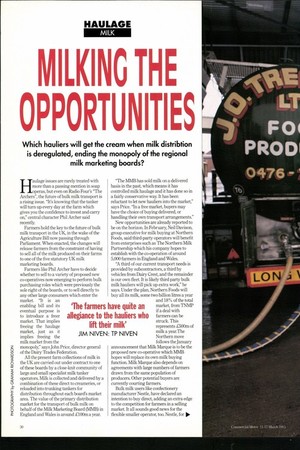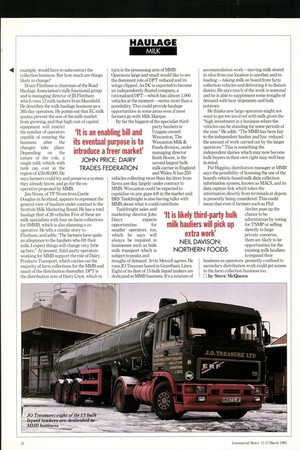MILKING THE OPPORTUNITIES
Page 32

Page 34

If you've noticed an error in this article please click here to report it so we can fix it.
Which hauliers will get the cream when milk distribtion is deregulated, ending the monopoly of the regional milk marketing boards?
Haulage issues are rarely treated with more than a passing mention in soap operas, but even on Radio Four's "The Archers", the future of bulk milk transport is a rising issue. "It's knowing that the tanker will turn up every day at the farm which gives you the confidence to invest and carry on," central character Phil Archer said recently.
Farmers hold the key to the future of bulk milk transport in the UK, in the wake of the Agriculture Bill now passing through Parliament. When enacted, the changes will release farmers from the constraint of having to sell all of the milk produced on their farms to one of the five statutory UK milk marketing boards.
Farmers like Phil Archer have to decide whether to sell to a variety of proposed new co-operatives now emerging to perform bulk purchasing roles which were previously the sole right of the boards, or to sell directly to any other large consumers which enter the market. "It is an enabling bill and its market. That implies lift the freeing the haulage market, just as it JIM NIVEN implies freeing the milk market from the monopoly" says John Price, director general g of the Dairy Trades Federation. All the present farm collections of milk in 6 the UK are carried out under contract to one • of these boards by a close-knit community of • large and small specialist milk tanker operators. Milk is collected and delivered by a O combination of these direct to creameries, or >, -a reloaded into trunking tankers for E distribution throughout each board's market area. The value of the primary distribution 8 market for the transport of bulk milk on 15 behalf of the Milk Marketing Board (IVIMB) in i England and Wales is around £100m a year.
"The MMB has sold milk on a delivered basis in the past, which means it has controlled milk haulage and it has done so in a fairly conservative way. It has been reluctant to let new hauliers into the market," says Price. "In a free market, buyers may have the choice of buying delivered, or handling their own transport arrangements."
New opportunities are already reported to be on the horizon. In February, Neil Davison, group executive for milk buying at Northern Foods, said third-party operators will benefit from enterprises such as The Northern Milk Partnership which his company hopes to establish with the co-operation of around 5,000 farmers in England and Wales.
"A third of our current transport needs is provided by subcontractors, a third by vehicles from Dairy Crest, and the remainder is our own fleet. It is likely third party bulk milk hauliers will pick up extra work," he says. Under the plan, Northern Foods will buy all its milk, some two billion litres a year and 18% of the total market, from TNMP if a deal with farmers can be struck. This represents £500m of milk a year.The Northern move follows the January announcement that Milk Marque is to be the proposed new co-operative which MMB hopes will replace its own milk buying function. Milk Marque also depends on agreements with large numbers of farmers drawn from the same population of producers. Other potential buyers are currently courting farmers.
Bulk milk users like confectionery manufacturer Nestle, have declared an intention to buy direct, adding an extra edge to the competition for farmers in a selling market. It all sounds good news for the flexible smaller operator, too. Nestle, for I■ example, would have to subcontract the collection business. But how much are things likely to change?
Bruce Flintham is chairman of the Road Haulage Association's milk functional group and is managing director of JB Flintham which runs 12 milk tankers from Mansfield. He describes the milk haulage business as a 365-day operation. He points out that EC milk quotas prevent the size of the milk market from growing, and that high cost of capital equipment will restrict the number of operators capable of entering the business after the changes take place. Depending on the nature of the role, a single milk vehicle with tank can cost in the region of L50-80,000. He says farmers could try and preserve a system they already know, and go for the cooperative proposed by MMB.
Jim Niven, of TP Niven from Castle Douglas in Scotland, appears to represent the general view of hauliers under contract to the Scottish Milk Marketing Board. He has a total haulage fleet of 26 vehicles. Five of these are milk specialists with four on-farm collections for SMMB, which is also planning a cooperative. He tells a similar story to Flintham, and adds: The farmers have quite an allegiance to the hauliers who lift their milk. I expect things will change very little up here." At present, third-party operators working for 1VIMB support the role of Dairy Products Transport, which carries out the majority of farm collections for the MMB and much of the distribution thereafter. DPI is the distribution arm of Dairy Crest, which in turn is the processing arm of MMB. Operators large and small would like to see the dominant role of DPI reduced and its wings clipped. As DC is expected to become an independently floated company, a rationalised DPI—which has almost 1,000 vehicles at the moment—seems more than a possibility. This could provide haulage opportunities in some areas even if most farmers go with Milk Marque.
By far the biggest of the specialist thirdparty hauliers is Unigate-owned Wincanton. The Wincanton Milk & Foods division, under managing director Keith House, is the second largest bulk milk carrier in England and Wales. It has 250 vehicles collecting more than 4m litres from farms per day, largely under contract to MMB. Wincanton could be expected to capitalise on any gaps left in the market and BRS Tankfreight is also having talks with MMB about what it could contribute.
Tankfreight sales and marketing director John Darcy expects opportunities for smaller operators too, which he says will always be required in businesses such as bulk milk transport which is subject to peaks and troughs of demand. Irvin Metcalf agrees. He runs JO Treasure based in Grantham, Lincs. Eight of its fleet of 15 bulk liquid tankers are dedicated to MMB business. It's a mixture of accommodation work—moving milk stored in silos from one location to another, and reloading —taking milk on board from farm collection vehicles and delivering it to distant dairies. He says much of the work is seasonal and he is able to supplement some troughs of demand with beer shipments and bulk potatoes.
He thinks new large operators might not want to get too involved with milk given the "high investment in a business where the vehicles can be standing for some periods of the year." He adds: "The MAIB has been fair to the independent haulier and has reduced the amount of work carried out by the larger operators." This is something the independent dairies which may now become bulk buyers in their own right may well bear in mind.
Pat Higgins, distribution manager at MMB says the possibility of licensing the use of the board's vehicle-based milk data collection information system, known as MACS, and its data capture link which takes the information directly from terminals at depots is presently being considered. This could mean that even if farmers such as Phil Archer pass up the chance to be adventurous by voting for TNMP or selling directly to large private concerns, there are likely to be opportunities for the existing milk hauliers to expand their business as operators presently confined to secondary distribution work could get access to the farm collection business too.
El by Steve McQueen
















































































